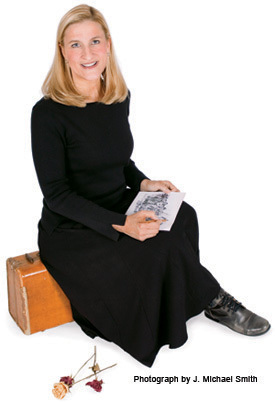Super Sad Love Story: Ruta Sepetys’s ‘Between Shades of Gray’ is a heartbreaking tale of courage | Under Cover

Few people know that Stalin deported more than 300,000 Lithuanians, including many women and children who were shipped to Siberia in cattle cars and left to die.
That was Stalin’s plan. There’s this quote which is just chilling, where Stalin says death is the solution to all problems—no man, no problem. What’s even more tragic, though, is that the Soviets occupied Lithuania, but then later, in 1941, the Germans kicked the Soviets out and the Germans along with Nazi collaborators killed over 200,000 Jews in Lithuania. Then, in 1944, the Soviets came back and deported three times as many people as they had in 1941. The book is about Lina, a 15-year-old girl who’s deported from Lithuania to Siberia and falls in love for the first time. The story chronicles not only her fight for survival, but also her struggle to retain faith in mankind amid Stalin’s terror.
Early on, the secret police burst into Lina’s home, arrest her family, and give them 20 minutes to pack up and leave. Is that based on fact?
Yes, it’s based on interviews I did with survivors and historians that I met with in Lithuania. Stalin considered business owners, lawyers, doctors, musicians, artists, even teachers and librarians, as a threat, and he was essentially going to get rid of them. And certainly my grandfather, who was in the Lithuanian military, was at the top of that list. One woman told me that it just so happened that she wasn’t home when the Soviets came for them. She came home, and the house was absolutely destroyed. Everyone was gone, and she never saw her family again.
What did you learn from the Lithuanian psychologists you interviewed as part of research for your first book?
When something really traumatic like this happens, a part of you dies. And for some people, it’s replaced with compassion—they were starving, yet they were helping other people that they didn’t even know. They could look at people in the camp and just by their face, they could tell who was going to die and who was going to survive. Then, they would try to bolster their spirits and literally try to save their lives. The psychologists said it was amazing how many people actually were able to do that.
What was it like writing about so much suffering?
At times, it was so overwhelming I had to take a break. It’s gut-wrenching to go through one story after another. If you’re reading about it, it’s one thing, but when you’re meeting with these people and they’re in front of you, holding your hand and telling you their story and crying…. There were points where I thought, I don’t think I can do this.
Your father and his family fled Lithuania and lived in refugee camps. How did he respond to your story?
His initial reaction was pretty emotional, because it’s very close to how he remembered so many people. But even more emotional was that he recognized certain personalities from our family in the book.
Such as?
Lina’s mother, Elena, is essentially my mother. Some of the things she says are literally things that my mom has said. And Lina’s father is very much like my father. He’s an artist, and it felt natural to give Lina a talent for art. It’s funny, because friends who have read the book, they’re like, so basically you made your parents her parents.
RELATED
The job outlook in 2030: Librarians will be in demand
The job outlook in 2030: Librarians will be in demand
ALREADY A SUBSCRIBER? LOG IN
We are currently offering this content for free. Sign up now to activate your personal profile, where you can save articles for future viewing






Add Comment :-
Be the first reader to comment.
Comment Policy:
Comment should not be empty !!!